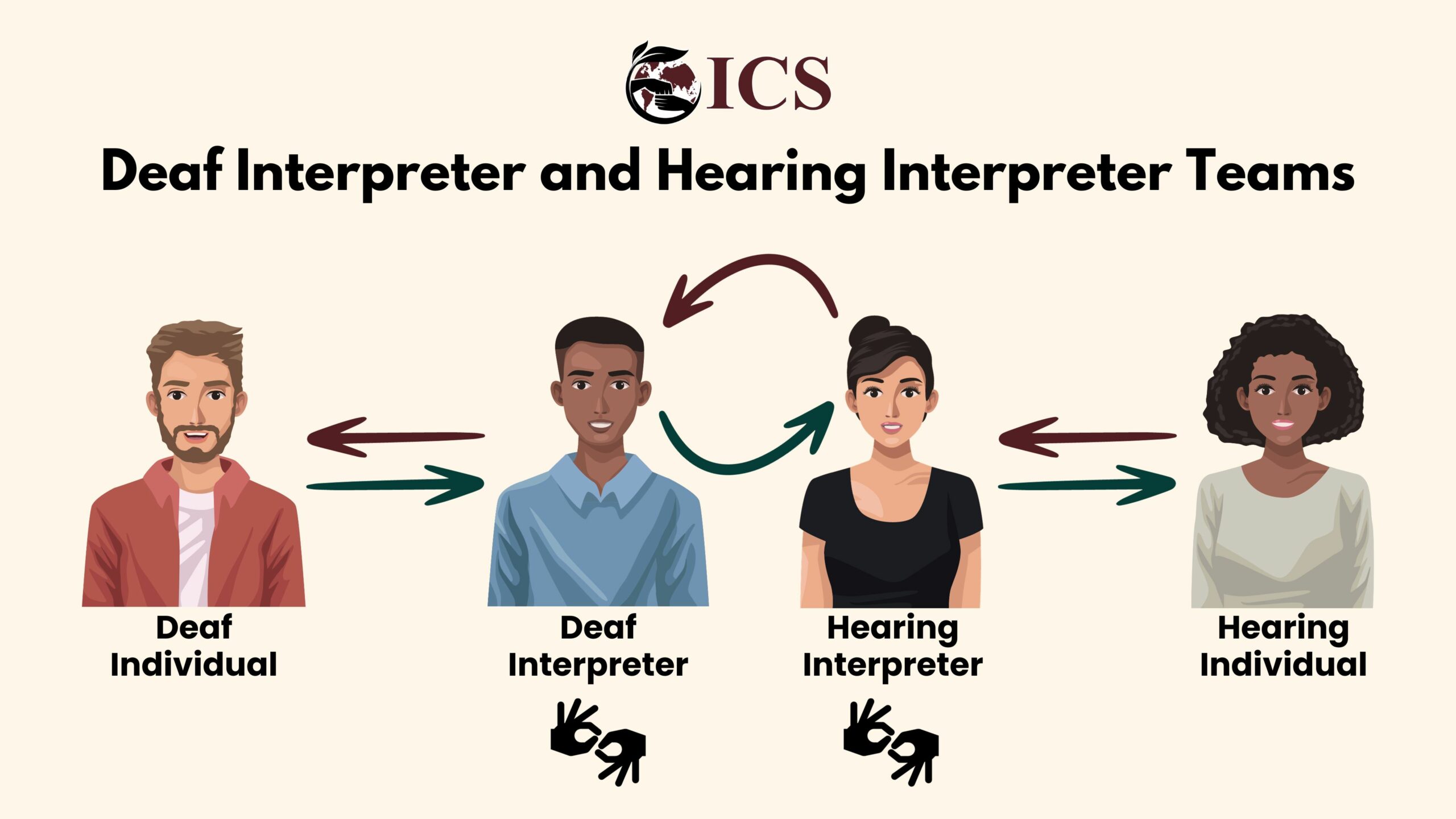Deaf Interpreters may have crossed your path without you even realizing it. Have you ever tuned in to a White House news briefing or caught an emergency weather broadcast? In these scenarios, Deaf individuals, certified as interpreters, collaborate with their hearing counterparts to facilitate communication between American Sign Language (ASL) and English.
These interpreters serve as vital conduits, bridging the gap and ensuring inclusive communication for all. In this article, we will delve into the world of Deaf Interpreters and explore the partnership they form with hearing interpreters.
What is a Deaf Interpreter?
A Deaf Interpreter (DI) is an individual who is Deaf with specialized training to interpret between ASL and English. They possess a unique set of formative linguistic, cultural, and life experiences that enable them to navigate a wide range of visual language and communication forms influenced by factors such as region, culture, age, and literacy.
Deaf Interpreters can pursue certification through the Registry of Interpreters for the Deaf (RID), where successful candidates are known as Certified Deaf Interpreters (CDIs).
Why Are Deaf Interpreters Important?
- Shared Experience: Deaf Interpreters share a unique understanding of the challenges faced by Deaf individuals in a predominantly hearing-centric world. This shared experience helps create a stronger connection between Deaf Interpreters and Deaf consumers fostering trust.
- Expertise in Culture and Community: Deaf Interpreters possess extensive knowledge and deep insights into Deaf Culture and the Deaf Community. This native expertise enables them to bridge cultural gaps and enhance the meanings of interpretations.
- Promote Effective Communication: Deaf interpreters play a pivotal role in promoting effective communication between Deaf and hearing individuals. Their specialized skills ensure that messages are conveyed accurately, reducing misunderstandings.
- Diverse Linguistic Proficiency: Did you know there are over 300 sign languages globally? Many Deaf Interpreters are trained in multiple foreign signed languages, including International Sign Language (IS), and excel at interpreting between these languages.
What is a Deaf Interpreter and Hearing Interpreter Team?
Deaf Interpreters often collaborate with hearing interpreters to form a powerful team that facilitates effective communication for Deaf and hearing individuals. These teams offer a level of linguistic and cultural bridging that can be challenging for hearing ASL-English interpreters to achieve when working alone.
It’s important to note that this recognition of the unique contributions of Deaf interpreters does not diminish the valuable role played by certified hearing interpreters, many of whom are deeply immersed in Deaf Culture and excel in their work.
In fact, hearing interpreters often recognize when a situation would be best served by the inclusion of a Certified Deaf Interpreter (CDI) and proactively recommend their involvement.
How Does the Team Function?
Together, the Deaf and the hearing interpreters create a two-person communication chain between Deaf and hearing individuals. For instance, during a doctor’s appointment, the Deaf patient signs to the DI, who in turn signs to the hearing interpreter, who verbally communicates with the doctor. This process may resemble a relay, but it involves more than just passing messages along; it encompasses linguistic and cultural processing to ensure the most effective communication.
The two interpreters in the team support one another by serving as a second set of eyes and ears, diligently monitoring the accuracy of interpretations. In particularly challenging cases, they may confer with each other to arrive at the best possible interpretation. This collaborative approach helps maintain the highest level of accuracy and effectiveness in communication.
When Should You Use Deaf Interpreter and Hearing Interpreter Teams?
- Emergency Broadcasts: Broadcasting emergency information to the public, especially to Deaf individuals with diverse linguistic backgrounds and signing customs, benefits from the expertise of Deaf Interpreters.
- Conferences: Large-scale conferences and events where precise communication is crucial for a diverse audience can greatly benefit from Deaf-Hearing Interpreting teams.
- Legal Proceedings: Legal situations, such as court hearings, often involve complex terminology and high stakes, making Deaf Interpreters an invaluable addition.
- Healthcare: Sensitive medical appointments concerning a Deaf person’s physical and mental health have profound impacts on their lives. Necessitating effective communication facilitated by Deaf-Hearing Interpreter teams is critical.
- DeafBlind or Low Vision: Individuals with limited vision benefit from Deaf Interpreters who can provide Protactile or tactile signing for clear communication.
- Children: In sensitive or critical situations involving children, Deaf Interpreters, especially those skilled in child communication, ensure effective understanding.
- Unique and Foreign Sign Languages: When the Deaf person uses a sign language different from ASL, nonstandard signs, or unique family, regional, ethnic, or age-related signs, a Deaf Interpreter is essential.
Champions of Accessibility
In conclusion, Deaf Interpreter and Hearing Interpreter Teams stand as champions of accessibility, embodying the essence of inclusive communication. They bridge linguistic and cultural gaps to ensure that Deaf and hearing individuals can connect effectively.
The remarkable expertise and native experiences of Deaf Interpreters empower them to provide invaluable insights, while their collaboration with hearing interpreters creates a partnership that enhances understanding in critical scenarios.
If you’re ready to experience the power of inclusive communication, we invite you to take the next step by requesting the services of Inclusive Communication Services to provide a Deaf Interpreter. Break down barriers, foster trust, and join us in building a more accessible and interconnected world for all.





